Here at Conscious Coliving we believe that coliving has the potential to be a new paradigm which shifts the focus of living away from privacy and towards connectedness.
But how can we achieve a sense of authentic community in our coliving spaces?
In the first of our London coliving meetups, co-hosted by Conscious Coliving, CO-LIV and Wigawam, and sponsored by SALTO KS and Mainyard Studios, we held a workshop on the challenges and strategies of growing community in coliving. This workshop was based upon meetups held by our fabulous Berlin team on the topics of wellbeing, community and sustainability.
At Mainyard Studios in East London a diverse group of people with a shared interest in coliving came together to take a deep dive into the juicy topic of growing authentic community. Attendees included past and present HMO/coliving operators, coliving recruitment specialists, coliving tech specialists and current/prospective coliving residents.
Our keynote speaker, Robert Birch, Gravity Coliving
The evening began with a talk from our keynote speaker, Robert Birch, Head of Operations at Gravity Coliving. Gravity is a new coliving scheme based in Finsbury Park, London, which has 35 rooms, and is already at full occupancy with a long waiting list.
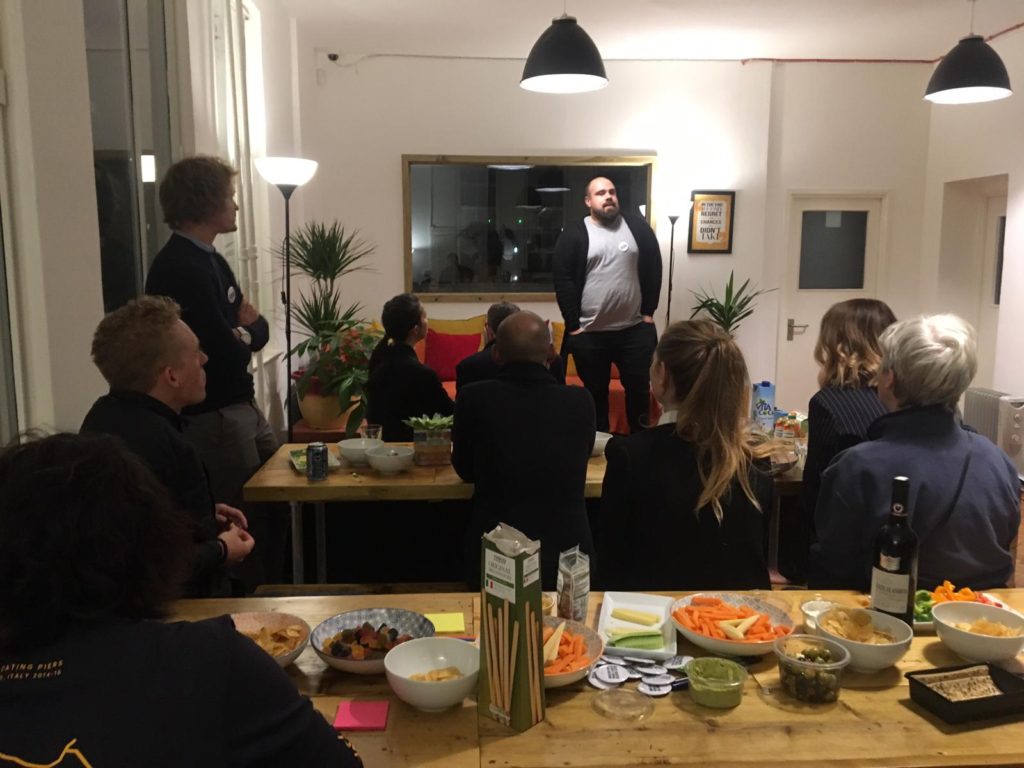
Robert emphasised that community should be at the forefront of any coliving operation, and that key to this is understanding what your target demographic do, and how can you as an operator support them in achieving their goals. Attracting that desired demographic means thinking carefully about where your coliving space should be located, what amenities you should include (and how to make flexible spaces), and having a strong and coherent website and marketing campaign.
Robert also pointed out that staff are gold. From your cleaners to your manager, everyone should know what the community’s goals are, as every interaction within the community should be a positive experience that pulls the community together.
Robert furthermore shared some insights around event planning. He noted that new coliving spaces need more interaction to ‘get the community fire started’, but that over-planning can easily become an issue. It’s wiser to go for quality over quantity. Partnering with local events companies is particularly effective in building local networks, and empowering members to hold their own events strengthens community engagement, and promotes personal growth too.
Robert finished by comparing operators to gardeners, who plant the seeds of community, but cannot completely control how the community will grow. They can only provide the right conditions to allow community to flourish in its own way.
Thank you to Robert for such an insightful start to the evening!
The workshop
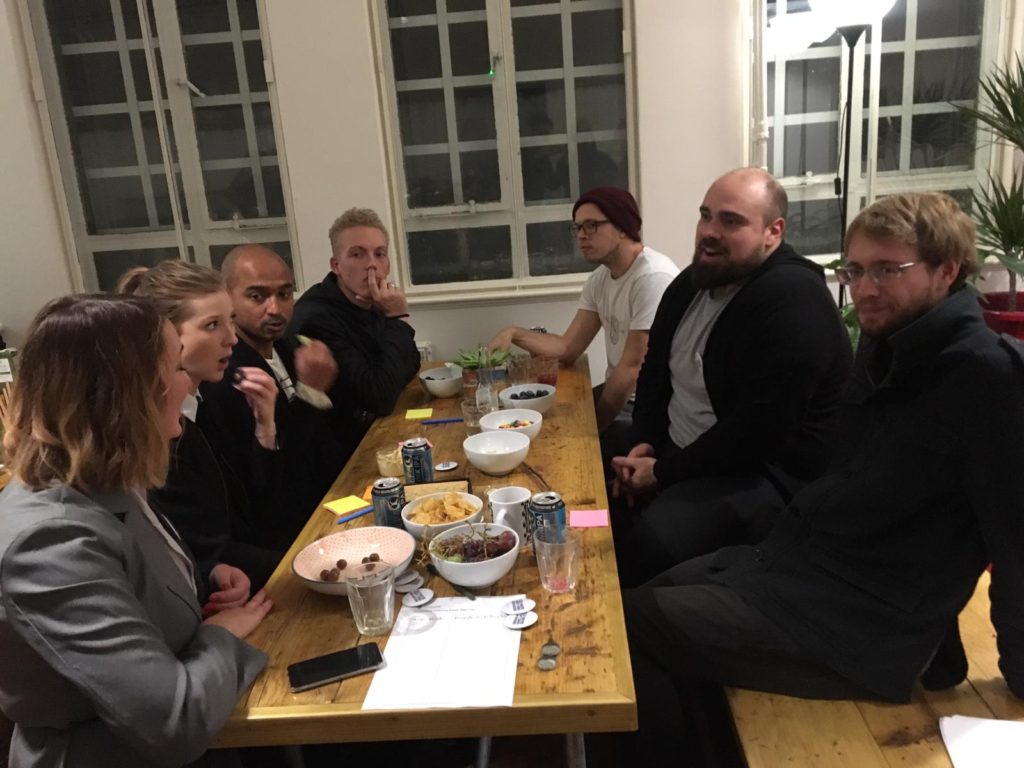
Attendees were then invited to pair up and discuss what they thought were the key challenges of growing authentic community in a coliving space. They wrote down their thoughts on sticky-notes, and we collated them on our wall, grouping them into three broad categories:
1. Curation and onboarding
2. Managing the community
3. Accommodating individual differences
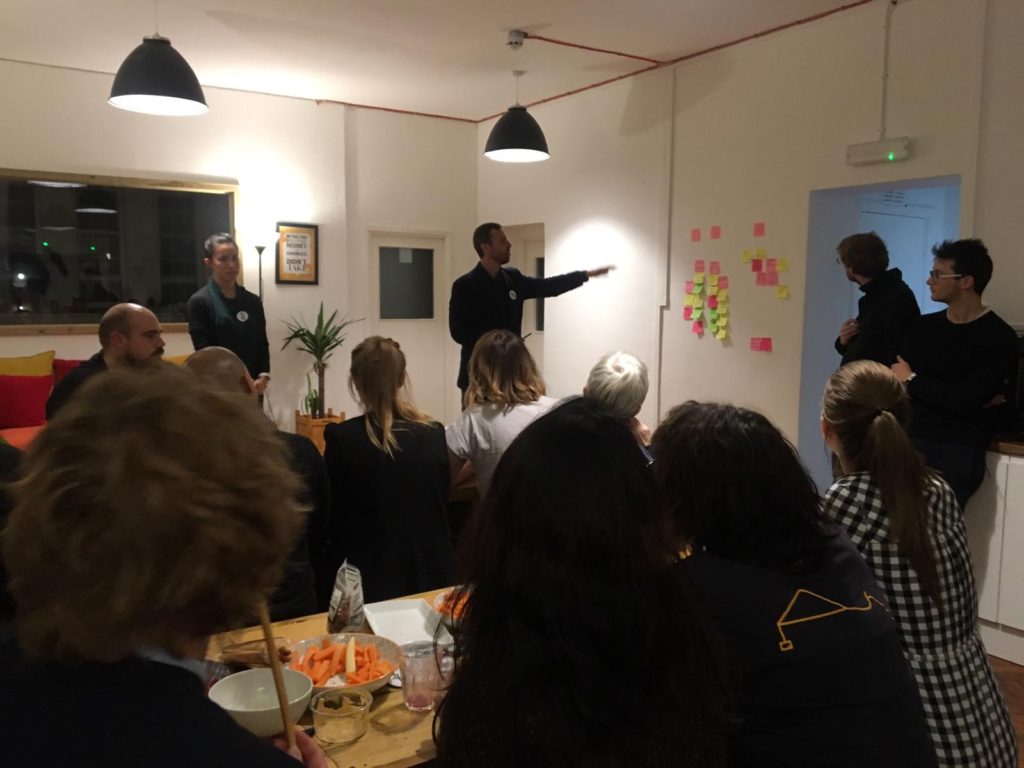
People then split into groups to discuss these challenges and think about strategies and solutions, which we then shared and discussed. Below we present the key conversation points and learnings from each group:
Curation and onboarding
- Understand what type of community it is you want to create, and what there is demand for. Factors to think about include: location type (city centre/retreat), size (large/boutique), financial model (profit/non-profit), level of shared living, who is your target resident and what issues do you want to solve for them?
- When launching a new space you can begin building the community before the house. Carry out detailed research: who’s out there and what are their needs?
- Finding residents can be achieved through basic marketing strategies (social media can be particularly effective). But make sure that prospective residents really understand what coliving is.
- A potential challenge is balancing the need to fill rooms with the need to find people who will be open to a more communal way of living. Honest conversations with applicants about the community culture can be helpful in helping them to understand whether they would be a good fit.
- The cost of getting the wrong tenant is much higher than the cost of saying no! Though it’s always worth saying no nicely, both because that is the right thing to do, and because a bad review can be very expensive!
- Community ambassadors (residents with extra responsibilities and slightly reduced rents) can be very valuable for onboarding and helping to create the community experience.
- When opening a new coliving space it can take a lot of energy to create that initial sense of community. This is where partnering with external event organisers can help breathe more energy into the community. Once the ball is rolling, the community will sustain itself.
- You must be responsive to criticism and be able to adapt.
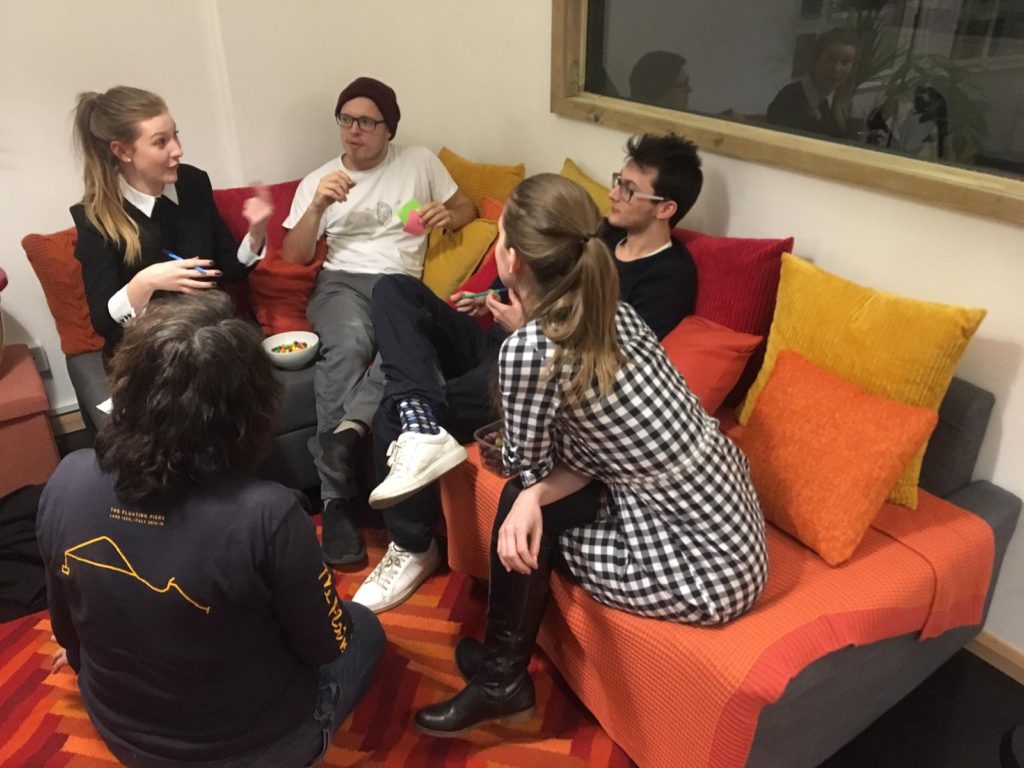
Managing the community
- Managing a community is about finding the balance between curating opportunities for connection and allowing a culture to develop organically. Think of yourself as a ‘gardener’: creating all the right conditions for community to grow and thrive.
- Community cannot be forced, and you must allow people to dip in and out of events and participation.
- What is your role as operator in terms of authority? Your role will depend on the size of the group. With a small group, authority can come more from the inside, with residents being able to assume more responsibility; whereas with a large group authority may have to be more top-down. Sometimes staying a little more on the ‘outside’ as an authority figure can actually help residents to generate a sense of community.
- Being responsive is key. Olga Nachaeva of No White Walls spoke about a community platform app that she had developed in which uptake was slow, as residents were using WhatsApp for everything instead. To persuade more residents to use the app, the decision was made to stop taking maintenance requests over WhatsApp, then to only make notifications about housing over the community app. This increased uptake, though people still used the WhatsApp group to chat. Olga made the point that this use of WhatsApp worked fine, and that this was an example of operations and the community meeting halfway.
- Be aware that no matter what, community churn is going to happen as people’s lives change, and that the addition or subtraction of one person can change the community. The need for being responsive and adaptive never ends.
Accommodating individual differences
- Be aware that if the community is too pushy it can drive people away, so it should be clear that community events are not compulsory.
- Make a decision about how close-knit your community is going to be, and then curate for that community.
- If neighbours don’t get along: try and intervene before conflict occurs (through doing things like designing for spaces which allow multiple people to easily use them, matching people with similar lifestyles together etc.), though it isn’t always possible to know when people won’t get along.
- Create events which bring residents together and allow them to see what they have in common with one another, and the relationships that can be formed are surprising.
- If conflict occurs then education about community living and appreciating differences can be helpful. It can be a great learning opportunity and a life lesson. Though you have to be careful to avoid being too didactic/interfering.
- Conflict resolution techniques, such as nonviolent communication, radical honesty and positive communication techniques can be helpful, though often require training, either on the part of community managers or residents.
- Do what you can to foster an atmosphere of trust between residents.
- Evictions may sometimes be necessary, if communication and mediation has been tried several times and hasn’t worked. The risk of not evicting a disruptive resident is that everyone else will leave if they don’t! Quite often a resident will realise when things aren’t working well, and if you make leaving financially favourable to the resident (e.g. offer them half rent for their final month) they will usually leave without trouble. Eviction is quite a viable option if managed ethically.
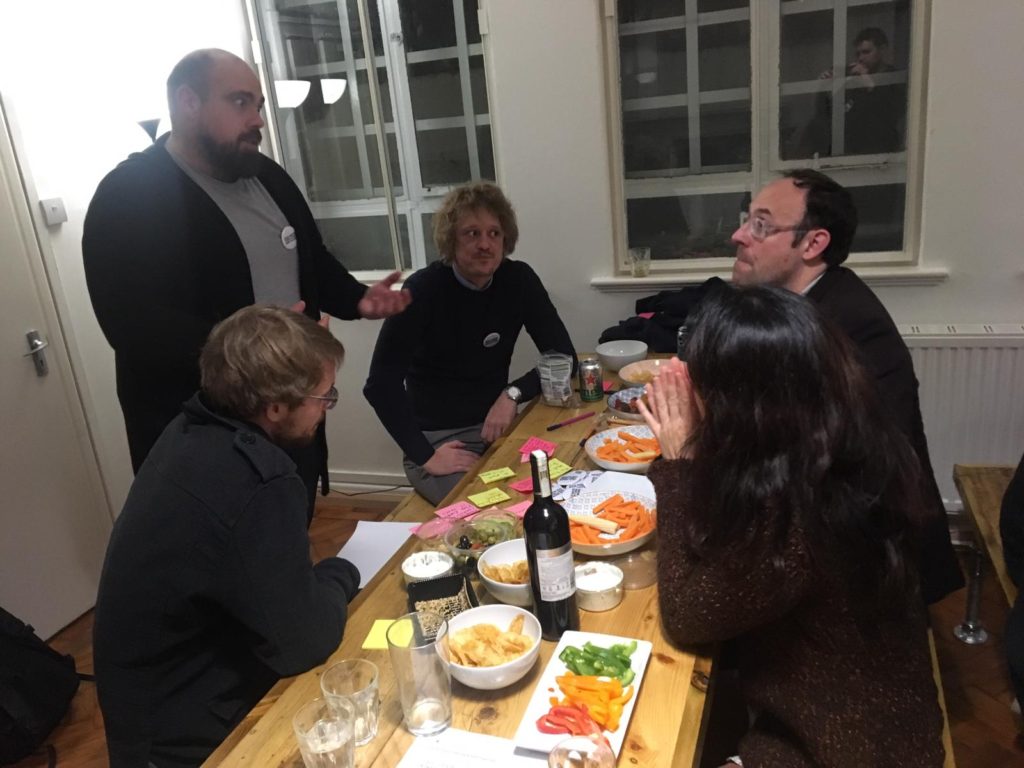
Main takeaways
This was an evening of lively discussion, and the diversity of attendees brought a multitude of perspectives. However, through this discussion we found that several key themes continually emerged:
- The importance of having a clear and coherent vision for your community which is based upon market research, and then curating effectively to find the community that fits that vision;
- Yet also being consistently responsive and adaptive to your community. You might create the vision, but let them tell you how to achieve it;
- The coliving operator as a ‘gardener’: they create the right conditions, but cannot and should not exactly control how the community will grow and flourish.
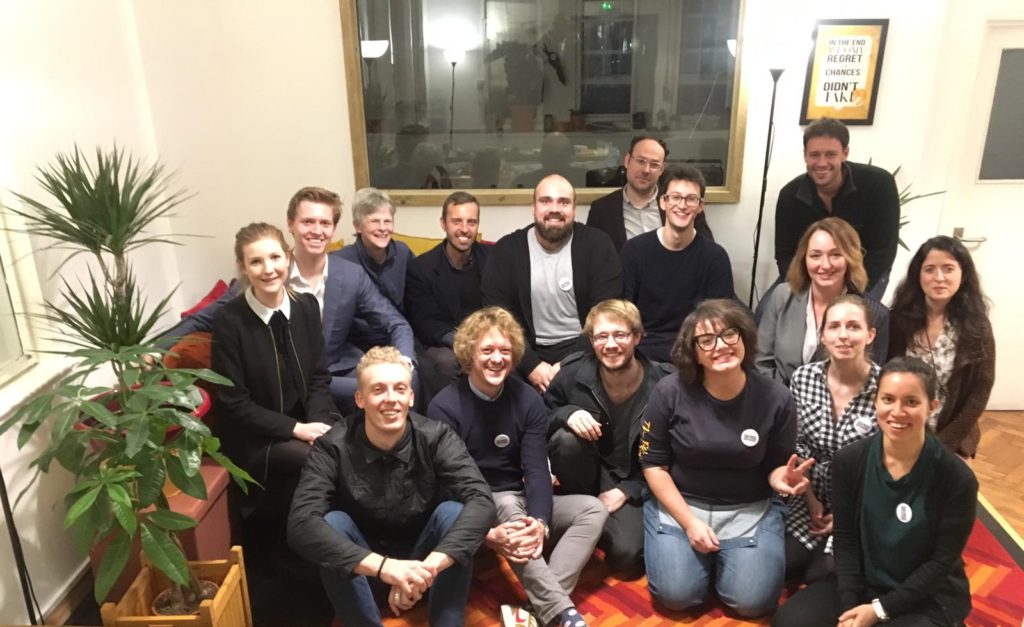
Sponsors
This event was sponsored by SALTO KS. SALTO Systems is proud to unlock a part of a future where there are no borders and where thought leaders from all over the globe are able to form a community that ignites creativity, productivity and health while living and working side by side. A future of Coliving that cultivates benefits like health, productivity and finance for generations to come.
If you are looking for an access control solution that can help you optimise your space in multiple ways and improve the customer experience even beyond, please contact us or Christian Schmitz (C.Schmitz@saltosystems.com)
This meetup was held at Mainyard Studios. Mainyard Studios provide affordable private offices, music studios, creative spaces and coworking to creative entrepreneurs on Bow Road in Tower Hamlets.
More coliving meetups coming
Look out on our Meetups page and in our Blog for more coliving meetups! Our next London event will be looking at personal wellbeing and coliving, on Tuesday 26th November. See you there!
Also, feel free to explore our coliving consultancy services and don’t hesitate to get in touch if you would like to have a conversation with us.
This article has been coauthored for you by:
Penny is Director of Research & Sustainability at Conscious Coliving. She has an MSc in Social Research Methods, and her PhD explores how shared living may enable lowered environmental impacts. She has consulted on numerous shared living projects, specialising in impact strategy, concept, and community. Penny has presented at conferences including the Co-Liv Summit, the Urban Living Festival, BTR360 and more. She has also authored publications in The Developer, Coliving Insights Magazine, the book Urban Communal Living in Britain, as well as being interviewed by the BBC and the Guardian about shared living.
Juan is a Communications Strategist, Project Manager, Systems Engineer, Team Coach and Executive Coach with an ontological/systemic approach. Co-author of the Coliving Apps, Software & Tech Guide and contributor of The Community Facilitation Handbook. He facilitates connection for individuals, teams, and communities.
Tom Manwell is a fully qualified U.K. architect. Before founding his two current companies, Tom gained experience with a range of award winning practices working on small, medium and large scale residential schemes in London, the U.K. and Europe.